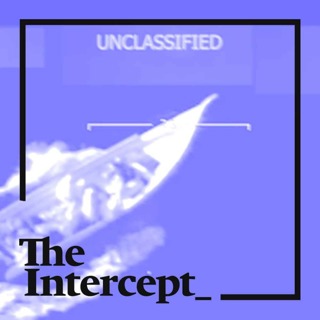
Iran’s Protest Movement and Its Future
For a month and a half, Iran has been rocked by protests. The sustained demonstration, which were kicked off after a young woman was killed by the notorious morality police, are the most serious challenge to the ruling regime in at least a dozen years — maybe since its inception. This week on Intercepted: Murtaza Hussain, a reporter at The Intercept, is joined by Neda Toloui-Semnani, a journalist and the author of “They Said They Wanted a Revolution: A Memoir of My Parents.” Toloui-Semnani discusses the recent trajectory of the protests in Iran and its parallels with the 1979 revolution. Then, Hussain is joined by Sanam Naraghi-Anderlini, a longtime activist, an expert working on issues of women in conflicts, and the founder of the International Civil Society Action Network. Naraghi-Anderlini and Hussain discuss the West’s approach to the demonstrations and the future of the movement. join.theintercept.com/donate/now Hosted on Acast. See acast.com/privacy for more information.
30 Nov 20221h 3min

This Is How the Federal Government Force-Feeds Detainees
In 2019, Ajay Kumar, an asylum-seeker from India, began a hunger strike while in ICE detention to demand his release. In response, the U.S. government force-fed Kumar. The Intercept accessed footage of the force-feeding, a practice widely condemned by international organizations. This week on Intercepted, Travis Mannon, a video producer with The Intercept, breaks down what took place during the force-feeding and why this video is so significant: This is the first public video of a federally sanctioned force-feeding by the U.S. government. Mannon reports on Kumar’s time in ICE detention, the force-feeding he experienced, and the ethical questions surrounding the practice. Jose Olivares, lead producer for Intercepted, co-reported this story. join.theintercept.com/donate/now Hosted on Acast. See acast.com/privacy for more information.
16 Nov 202233min

The Fed's War on Workers
This week, the Federal Reserve is expected to raise interest rates again, despite coming under scrutiny in recent months for its aggressive hikes to battle inflation. This week on Intercepted: Jon Schwarz, senior writer with The Intercept, talks all things Fed, the most powerful economic institution in the U.S. Schwarz is first joined by Intercept reporters Ken Klippenstein and Daniel Boguslaw, who discuss how banks are lobbying the Fed, raising questions about the institution’s independence. Schwarz is then joined by former Fed economist Claudia Sahm to break down the Fed’s role in the economy and how its efforts to curb inflation are destabilizing the global economy and raising unemployment.Ken and Dan's story "The Fed Likes to Tout its Independence. So Why are Big Banks Lobbying It?": https://theintercept.com/2022/10/26/federal-reserve-bank-lobby/join.theintercept.com/donate/now Hosted on Acast. See acast.com/privacy for more information.
2 Nov 202259min

Crime of Aggression
Earlier this week, Russia launched a new drone bombing spree in the Ukrainian capital of Kyiv. This followed last week's attack, when Russian missiles struck the capital and other parts of the country. This week on Intercepted: reporter Alice Speri breaks down the different international investigations into Russia’s crimes in Ukraine and explains why none include the crime of aggression. She speaks with human rights investigators and international humanitarian law experts, who break down what they think needs to happen to achieve justice for the victims of Russia’s crimes and set a precedent to prevent future acts of aggression. But prosecuting Russian leaders for the invasion of Ukraine may be a challenge, for fear it may boomerang back on Western aggressors. join.theintercept.com/donate/now Hosted on Acast. See acast.com/privacy for more information.
19 Okt 202234min

Bonus: Egypt’s Carceral Climate Summit
On October 6, 2022, University of British Columbia faculty members Mohammed Rafi Arefin and Naomi Klein from the new Centre for Climate Justice co-moderated a livestream discussion about the upcoming COP27 summit that will be held in Egypt, while the country’s most prominent pro-democracy activist, Alaa Abd El Fattah, remains in prison.As the world gets hotter, basic freedoms are under ever greater assault around the globe. These trends are about to collide in dramatic fashion at the upcoming United Nations climate summit, which this year takes place in Egypt, under the iron rule of Gen. Abdel Fattah el-Sisi. Just a decade ago, Cairo’s Tahrir Square was synonymous with a hopeful, youth-led movement for liberation and democracy. Today, journalists are routinely arrested and thousands of political prisoners languish behind bars. With Egypt on the front lines of climate impacts and escalating repression, this panel discussion tackled tough questions about the relationship between meaningful climate action and political freedom. Is it possible to have one without the other? Are Egypt’s political prisoners being sacrificed in the name of climate urgency? What are the responsibilities of those choosing to attend the summit? What pressure can be brought to bear in this microcosm of the intersection of climate and justice? What pressure points exist for political action in Egypt’s debt negotiations and the government’s drive to attract foreign capital in areas like green energy?Hear from Sanaa Seif, sister of Alaa Abd El Fattah, as well as celebrated writers, journalists, and activists Omar Robert Hamilton, Sharif Abdel Kouddous, and Bill McKibben.Intercepted is publishing a lightly edited version of the livestream. Hosted on Acast. See acast.com/privacy for more information.
10 Okt 20221h 18min

Inside the Chinese Government’s Growing Surveillance State
The Chinese government forcibly collects biometric markers like fingerprints, facial images, and DNA of Xinjiang residents, where 12 million Uyghurs live. In recent years, the country has expanded and improved its surveillance capabilities. This week on Intercepted: investigative reporter Mara Hvistendahl speaks with Josh Chin and Liza Lin, reporters for the Wall Street Journal, about their new book, “Surveillance State: Inside China’s Quest to Launch a New Era of Social Control.” In their book, Chin and Lin break down the international implications of the Chinese government’s adoption of surveillance technology. Hvistendahl, Chin, and Lin discuss techno-dystopia in the pandemic era, what happens when there are no checks on algorithms, and how Western companies helped the Chinese government build the surveillance state from day one. join.theintercept.com/donate/now Hosted on Acast. See acast.com/privacy for more information.
5 Okt 202246min

No Way Home, Episode Four: Getting Out Alive
Marked as enemies of the new Taliban regime by his work with Westerners and his family’s Hazara ethnicity, Hamid, his wife, their 8-year-old daughter, and their new baby move furtively from place to place, living under assumed names. Their year in Taliban-controlled Afghanistan echoes Hamid’s own war-torn childhood as he tries to guarantee his daughter’s future. Suddenly, an escape route opens: Will they finally make it out?Created by Afghans forced into exile when the Taliban took over last year, “No Way Home” tells of the perilous exodus born of two decades of broken promises in the U.S. war on terror. Through the stories of four Afghans who tried to leave when the U.S. military pulled out of Afghanistan last summer, these Afghan storytellers use their own experiences of departure, loss, and resilience to illuminate the dark end of America’s longest war. A production of The Intercept and New America, “No Way Home” is a four-part series available on the Intercepted podcast. Hosted on Acast. See acast.com/privacy for more information.
21 Sep 202227min

No Way Home, Episode Three: Born Again
Maryam Barak, an Afghan journalist, made it to Italy with her family last summer. In Rome, she met Qader Kazimizada, another newly arrived Afghan who is helping refugees find community in an alien place.Created by Afghans forced into exile when the Taliban took over last year, “No Way Home” tells of the perilous exodus born of two decades of broken promises in the U.S. war on terror. Through the stories of four Afghans who tried to leave when the U.S. military pulled out of Afghanistan last summer, these Afghan storytellers use their own experiences of departure, loss, and resilience to illuminate the dark end of America’s longest war. A production of The Intercept and New America, “No Way Home” is a four-part series available on the Intercepted podcast. Hosted on Acast. See acast.com/privacy for more information.
18 Sep 202225min






















